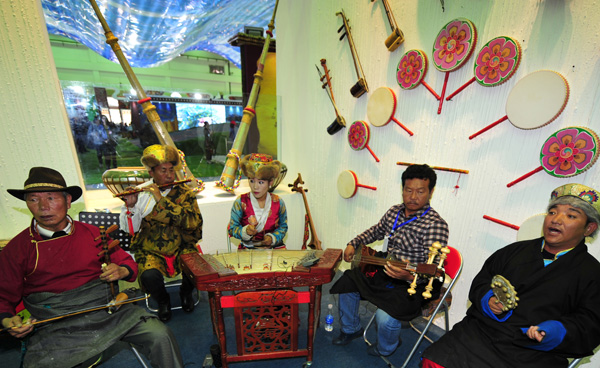Tourism helps alleviate poverty in Tibet
 |
|
Tibetan artists perform during the Third China Tibet International Tourism and Culture Expo in Lhasa on Sunday. [Photo by TENTSEN SHINDEN/TIBET DAILY] |
Residents of the autonomous region discover new ways to profit from visitors
Residents of the Tibet autonomous region have benefited over the past few years from tourism, which has enhanced the economy, an official with the local tourism authority said.
Thanks to efforts to stimulate tourism in Tibet, the region's economy has seen a rapid boom in recent years, said Shi Yuhui, deputy director of the region's tourism development commission, during the Third China Tibet International Tourism and Culture Expo, which kicked off on Saturday.
According to the region's 2016 government work report, the region received a record 20 million tourists from home and abroad in 2015, contributing 28 billion yuan ($3.72 billion) to the tourism industry-27.5 percent of the region's GDP.
In the past five years, 67 million tourists have visited Tibet, generating 87.5 billion yuan in revenue, according to the report.
The region's tourism industry experienced 23.4 percent average annual growth in visitors, it said.
"We largely improved our tourism infrastructure to face the rising number of tourists, and the boom also encouraged a large number of residents to participate in the tourism industry and benefit from it," Shi said.
Despite the achievements, he said, the quality of tourist services and management must be further improved.
Developing tourism will continue to speed up during the 13th Five-Year Plan (2016-20) period, the report said.
Shi applauded the growth in Tibet's tourism and said residents are becoming engaged in the tourism industry, because "they found that tourism can help them out of poverty".
Now, the poverty alleviation teams have crisscrossed Tibet, and the regional financial department has also funded poverty alleviation projects connected with tourism, he said.
In the meantime, tourism training has been extended to the region's counties and townships, aiming to meet the tourism industry's need for human resources, he said.
"Tourists can now enjoy better services and a wider variety of activities, including horseback riding, cultural entertainment and Tibetan family inns," he said.
For example, visitors will know more about Tibetan culture after they watch the live action operas of Prince Wencheng and Gyaltse Traces, he said, which also narrows the gap between tourists and Tibetans.
In addition, ethnic performances, cultural feasts and delicacies are good choices for people who travel to Tibet.
"Of course, they can shop for local specialties at the same time," he said.
The regional government has invested heavily in city construction, hoping to turn the region's capital, Lhasa, into a global tourism destination, and to turn Nyingchi into an ecological tourism city, he said.
Wei Hongtao, deputy director of the China National Tourism Administration, gave a keynote speech during a forum at the expo, suggesting that the regional government should provide its own tourism specialties to promote the local economy.
He called on the government to build more roads and parking lots, and to pay close attention to environmental and cultural protection.

























